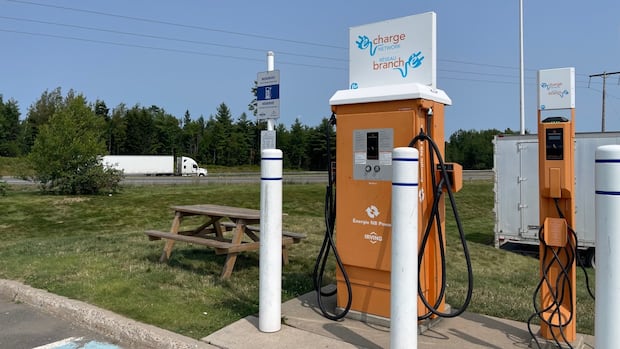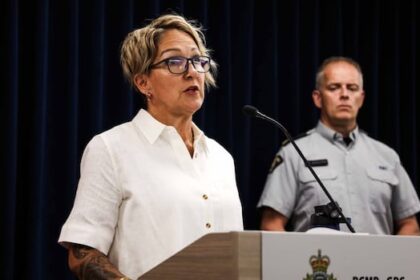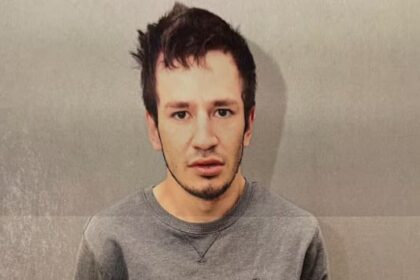Jean-Marc Robichaud finally bought a fully electric vehicle in 2021.His Hyundai Kona, the type of low-emissions car he’d wanted for over a decade, was cheaper thanks to federal and provincial electric vehicle incentives.Robichaud received $5,000 from the federal government and another $5,000 from the province after his purchase, dropping the total for the car to $43,500.His wife enjoyed the switch to electric so much she bought herself a Kona a year later. Once again they received $10,000 in incentives after their purchase, knocking the final price down to $51,295.Robichaud was happy to get the incentives, despite already having his sights set on going electric.”‘Sweet, this is available,’ that’s how it was. More than sweet, really, it was excellent,” he said.Jean-Marc Robichaud bought his fully electric Hyundai Kona in 2021. A year later his wife bought the same model. They both received federal and provincial incentives. (Submitted by Jean-Marc Robichaud)The incentive programs were created to help drivers make the move from gas- and diesel-powered vehicles to electric and hybrids, in a bid to lower greenhouse gas emissions.June 30 was the last day to buy an EV and be eligible for compensation from the province. The last day New Brunswickers could apply to get the incentive was July 30.The program issued 6,000 EV rebates and 1,300 home charger rebates over its four-year lifespan, with more still being processed.WATCH | ‘Incentives are a really nice way to give us that little nudge,’ EV advocate says: Electric vehicle incentive ends, N.B. turns to charger networkNew Brunswick’s electric vehicle incentive, which offered up to $5,000 to EV buyers, has ended. Now, the province says it will focus on adding chargers to its network, including 16 more this year.People receiving an incentive were also eligible for up to $750 to install a home charger.Roughly $28 million was spent on the program since its launch in July 2021.The federal government paused their version of the program in January when it ran out of funds, but announced in June it’ll soon make a comeback.Energy Minister René Legacy declined an interview about the future of the incentive program.David Kelly, a spokesperson for Legacy, provided an emailed statement instead.”With prices for electric vehicles becoming more affordable, the decision was made to wrap up New Brunswick’s electric vehicle incentive and focus on adding to the province’s charging infrastructure, which has been identified as a main concern by those looking to make the transition to an EV,” the statement said.New Brunswick Energy Minister René Legacy says the province is now focused on adding to the province’s charging infrastructure. (Michael Heenan/CBC)The province hopes a stronger charging network “will continue to fuel EV sales,” but could not provide CBC News with data about the number of chargers it needs to meet demand.As a speaker and consultant on sustainability based in New Brunswick, Carl Duivenvoorden pays close attention to incentives and hopes they’ll be available for consumers again soon.”The loss of the incentive, I think, will set back a bit our transition over to EVs, and that’s too bad,” he said.Duivenvoorden feels the incentives were a way to give people “that little nudge,” since a difference in sticker prices still remains between EVs and comparable gas-powered vehicles. ‘Shifting its focus’When New Brunswick announced was ending in its program, a March news release from the province said it was “shifting its focus to addressing the need for more charging infrastructure.”The release also called the program a success, saying it achieved its goal of EVs making up six per cent of new light-duty vehicle sales by this year. More than 7,400 electric vehicles have been registered in New Brunswick, according to the provincial Energy Department.According to a Department of Natural Resources report, Canada will need about 679,000 public chargers by 2040. There are 38,696 chargers in the country now.Duivenvoorden has taken his 2019 Chevrolet Bolt coast to coast, and said New Brunswick’s charging network is very good and ranks “towards the top end of the middle of the pack.”He has found Quebec and British Columbia are the best while the prairies, southern Ontario, P.E.I and Newfoundland are good. He calls Nova Scotia and northern Ontario’s networks “fairly weak.”Carl Duivenvoorden just returned from driving his 2019 Chevrolet Bolt to British Columbia and back. He had first-hand experience of each province’s EV charging network and ranks New Brunswick toward the top of the list. (Submitted by Carl Duivenvoorden )Duivenvoorden said N.B. Power’s eCharge Network has evolved over the years, and its only weakness now is that some locations only have one charger. With one plug, that leaves drivers waiting or tracking down the next charger on their route.Duivenvoorden and Robichaud both said around 90 per cent of their charging is done at home.”You’re not charging anywhere except if you go on a trip. Then all of a sudden those chargers become important. Very important,” said Robichaud, who has seen public charging improve since 2021.His trip to Quebec used to take him 12 hours and now, because of new chargers along the western border of New Brunswick, his trip is down to 10 hours.According to Kelly, between N.B. Power and third-party stations, the province had 187 Level 2 chargers and 85 fast chargers at the start of 2023.Today, there are 349 Level 2 chargers and 151 fast chargers.N.B. Power’s website says a Level 2 charger can fully charge an all-electric vehicle in six to 12 hours, while a fast charger takes less than an hour.The province has budgeted $4 million to improve its charging network this fiscal year and will install 16 new chargers, including eight 320 kW fast chargers, which can charge two vehicles at the same time.Future of N.B. networkFrançois-Guy Haché, N.B. Power’s electric mobility lead, said range anxiety is “one of the main barriers” for people considering buying EVs.Haché said N.B. Power is focused on putting chargers along main highways to deal with that fear and allow drivers to “travel further without having big gaps in the province.”According to Haché, the province’s utility company is “well positioned grid-wise” and will have to keep monitoring how EV chargers are used as more are installed.N.B. Power is seeing the number of charging sessions “almost doubling year over year,” he added.Haché said the utility plans to build with demand as more EVs hit the road.University of Toronto engineering professor Olivier Trescases, who runs the university’s electric vehicle research centre, says it’s difficult to know how many chargers are needed. (Lisa Xing/CBC)Olivier Trescases, a professor at the University of Toronto and director of the university’s EV Research Centre, describes the vehicle charging conundrum as a “chicken and egg problem”: it’s difficult, he says, to know how many chargers we actually need.He said having Crown corporations operate chargers can help keep costs down.For now, Trescases thinks education is important if people are going to choose electric without incentives.”Every new technology has to stand on its own legs and we’ve seen that with all major technologies,” he said.”It’s very, very difficult to get on to the mass adoption phase, and I think we’re getting there soon.”
Electric vehicle incentives end in N.B., focus shifts to charger network











